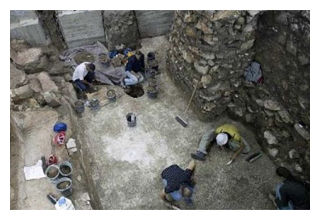
The skeletons date between 8,000 and 4,200 years ago, meaning the burial place was used for millennia.
"It must have been a place of memory," said study co-author Mary Anne Tafuri, an archaeologist at the University of Cambridge. "People throughout time have kept it, and they have buried their people, over and over, generation after generation."
About 15 women and children were buried in the rock shelter, while five men and juveniles were buried under giant stone heaps called tumuli outside the shelter during a later period, when the region turned to desert.
The findings, which are detailed in the March issue of the Journal of Anthropological Archaeology, suggest the culture changed with the climate.











